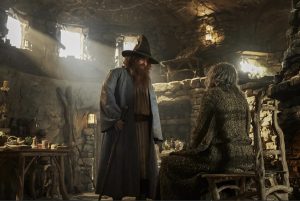For the past few weeks, I have been enjoying the second season of one of my favorite shows available to stream.
There are some Tolkien purists who do not care for the show, but I will not quibble with some of the licenses taken. The way I see it: Better is one day in Middle-Earth than in thousands elsewhere.
The Peter Jackson-directed Lord of the Rings and Hobbit trilogies all take place during the Third Age of J.R.R. Tolkien’s mythological world. Those films center on the Dark Lord Sauron’s attempt to regain power by again possessing the One Ring. He is thwarted in that effort by the hobbit Frodo Baggins who brings the One Ring to the only place it can be destroyed: the fires of Mount Doom in the land of Mordor.

Tyler Tankersley
The Rings of Power series takes place in the Second Age of Middle-Earth and it tells the story of the forging of all of the Rings of Power as depicted in the famous poem written on the One Ring:
Three Rings for the Elven-kings under the sky,
Seven for the Dwarf-lords in their halls of stone,
Nine for Mortal Men doomed to die,
One for the Dark Lord on his dark throne
In the Land of Mordor where the Shadows lie.
One Ring to rule them all, One Ring to find them,
One Ring to bring them all and in the darkness bind them
In the Land of Mordor where the Shadows lie.
In my opinion, the most compelling character in The Rings of Power is known simply as The Stranger. We first met him at the end of the premiere episode of season one when characters across Middle-Earth watched as a meteor fell to earth. Two Harfoots (ancestors of the hobbits) come to the crater where the meteor fell and found there a bearded man. He has no memory of who he is, but he has the ability to make miraculous things happen in the natural world.
Throughout the first season, the identity of the Stranger unfolds more and more as his powers emerge. Eventually at the end of the season we learn he is not a man at all, but is Istar. It’s an Elvish word meaning “Wise One” or wizard. And his story climaxes in season one with one of the Harfoots declaring to the Stranger: “Only you can show what you are. You choose by what you do. You’re here to help. I know it.”

Rory Kinnear and Daniel Weyman in “The Lord of the Rings: The Rings of Power.” (Photo by Ross Ferguson / Prime Video – © Amazon MGM Studios)
The most famous of the wizards in Middle-Earth is, of course, Gandalf. He’s the gray, grizzled old man who helps save the day throughout The Hobbit and The Lord of the Rings. The writers of Rings of Power keep hinting that the identity of the Stranger may turn out to indeed be Gandalf. Although, personally, I hope he is not Gandalf as that would not make sense with the lore (in Tolkien’s writings, Gandalf does not arrive in Middle-Earth until the Third Age). I hope instead the Stranger is one of the Blue Wizards (Tolkien later wrote that the Blue Wizards came in the Second Age).
The Istari (“Wizards”) in Tolkien’s world play an interesting role. They are perhaps some of the most powerful beings in the world, yet their task is not to wield their power for themselves (see Saruman). Instead, the wizards are to use their powers to help strengthen and form the characters of others.
In the book Unfinished Tales, Tolkien wrote that the wizards were not “to seek to rule the wills of Men or Elves by open display of power, but coming in shapes weak and humble were bidden to advise and persuade Men and Elves to good, and to seek to unite in love and understanding all those whom Sauron, should he come again, would endeavor to dominate and corrupt.”
“For those of us in pastoral ministry, it seems our callings are something akin to the wizards of Middle-Earth.”
Throughout this second season of the The Rings of Power, we have seen the Stranger seek to learn about his task or his calling. He is aided in this discovery by none other than the mysterious man named Tom Bombadil, a person so strange and weird that Peter Jackson completely removed him from the Lord of the Rings films. Tom Bombadil represents Creation itself (“Tom was here before the river and the trees; Tom remembers the first raindrop and the first acorn.”) By learning from Tom — connecting to nature — the Stranger is learning more and more what it means to be an ambassador for goodness in the world.
Perhaps it is my own vocation in ministry that draws me to the story of the Stranger. Our callings are a mysterious thing, are they not? The New Testament uses the Greek word, kaleo meaning “to be called” or “to be summoned.” Whether it’s Jesus calling to Peter and James to follow him or its Moses hearing the voice of God speak through the burning bush or Mary being asked to bear the hope of the world, the Bible is full of stories where people are discerning the call on their lives.

Daniel Weyman as The Stranger in “The Lord of the Rings: The Rings of Power.” (Screencap/IMDB)
For those of us in pastoral ministry, it seems our callings are something akin to the wizards of Middle-Earth. God has given us the task of seeking to be ambassadors of reconciliation not for ourselves, but so that we might help strengthen the character of others (and thereby be changed within our own souls). And perhaps we sometimes need to be reminded of that calling by connecting to creation and immersing ourselves in a world beyond the need to plan the next church event, write the next sermon, answer the next email.
In his memoir simply called The Pastor, the author and pastor Eugene Peterson (a kind of wizard himself) wrote, “The vocation of pastor has been replaced by the strategies of religious entrepreneurs with business plans.”
I feel that pull in my own life as a pastor. There is sometimes great anxiety in others (and in myself) about the need to grow the membership numerically, to increase the budget, to find innovative ways to grow this church into a powerhouse within our community. And there are temptations as a pastor to exercise power and authority in ways that build our own egos. I would be lying to you if I said that sort of path never was a temptation.
But then there are small, quiet moments where I am reminded of my calling. Sometimes I am in awe of the wisdom of one of my fellow pastors. Sometimes I am the witness of seeing two of my church members care for one another. Sometimes I hear the voice of a youth in our church speak for justice. Sometimes I join my voice to others in worship and it reorients me to the One who made me and redeemed me. In those moments, I am reminded that I show who I am by what I do. That I am here to help.
Tyler Tankersley serves as senior pastor of Ardmore Baptist Church in Winston-Salem, N.C., and is currently pursuing a doctor of ministry degree in leadership and spiritual formation from George Fox University.


